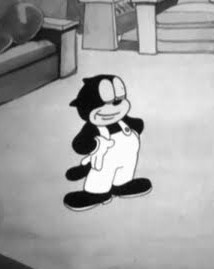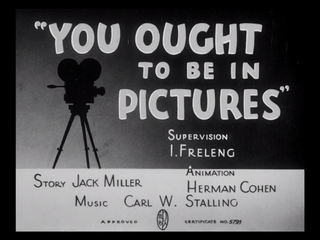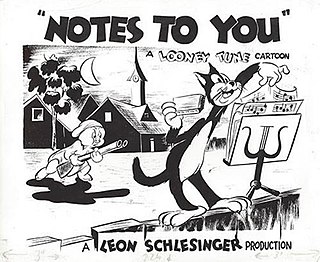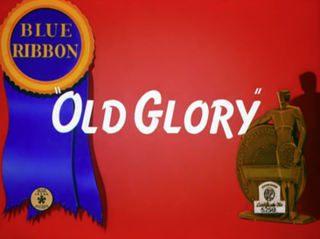
Looney Tunes is an American animated franchise produced and distributed by Warner Bros. It began as a series of short films that originally ran from 1930 to 1969, alongside the related series Merrie Melodies, during the golden age of American animation. Following a revival in the late 1970s, new shorts were released as recently as 2014. The two series introduced a large cast of characters, including Bugs Bunny, Daffy Duck, and Porky Pig. The term Looney Tunes has since been expanded to also refer to the characters themselves.

Porky Pig is a cartoon character in the Warner Bros. Looney Tunes and Merrie Melodies series of cartoons. He was the first character created by the studio to draw audiences based on his star power, and the animators created many critically acclaimed shorts featuring the character. Even after he was supplanted by later characters, Porky continued to be popular with moviegoers and, more importantly, the Warners directors, who recast him in numerous everyman and sidekick roles.

Porky in Wackyland is a 1938 Warner Bros. Looney Tunes animated short film, directed by Bob Clampett. The short was released on September 24, 1938, and stars Porky Pig venturing out to find the last do-do bird, which he finds in Wackyland, a land that makes no sense located in Darkest Africa.
This is a listing of the shorts, feature films, television programs, and television specials in the Looney Tunes and Merrie Melodies cartoon series, extending from 1929 through the present day. Altogether, 1,002 animated shorts alone were released under the Looney Tunes and Merrie Melodies banners from the 1930s through the 1960s. From the beginning to the present day, 1,041 theatrical shorts have been created.

Petunia Pig is an animated cartoon character in the Looney Tunes and Merrie Melodies series of cartoons from Warner Bros. She looks much like her significant other, Porky Pig, except that she wears a dress and has pigtailed black hair.

Piggy is the name of two animated cartoon characters in the Merrie Melodies series of films distributed by Warner Bros. The first character was a fat, black pig wearing a pair of shorts with two large buttons in the front, and his first film was You Don't Know What You're Doin'!

Gold Diggers of '49 is a 1935 Warner Bros. theatrical animated cartoon short in the Looney Tunes series.

Beans the Cat is an animated cartoon character in the Warner Bros. Cartoons series of cartoons from 1935–1936. Beans was the third Warner Bros cartoon character star after Bosko and Buddy. He was voiced by Billy Bletcher. He was created by director Friz Freleng. The character was featured in nine cartoons made in 1935 and 1936.

I Haven't Got a Hat is a 1935 animated short film, directed by Isadore Freleng for Leon Schlesinger Productions as part of the Merrie Melodies series. Released on March 2, 1935, the short is notable for featuring the first appearance of several Warner Bros. cartoon characters, most notably future cartoon star Porky Pig. Beans the Cat, a minor Looney Tunes star in 1935-1936, also made his first appearance in this cartoon.
Warner Bros. Cartoons, Inc. was an American animation studio, serving as the in-house animation division of Warner Bros. during the Golden Age of American animation. One of the most successful animation studios in American media history, it was primarily responsible for the Looney Tunes and Merrie Melodies series of animated short films. The characters featured in these cartoons, including Bugs Bunny, Daffy Duck, and Porky Pig, are among the most famous and recognizable characters in the world. Many of the creative staff members at the studio, including directors and animators such as Chuck Jones, Friz Freleng, Robert McKimson, Tex Avery, Robert Clampett, Arthur Davis, and Frank Tashlin, are considered major figures in the art and history of traditional animation.

You Ought to Be in Pictures is a 1940 Warner Bros. Looney Tunes short film directed by Friz Freleng. The cartoon was released on May 18, 1940, and stars Porky Pig and Daffy Duck.

Baby Bottleneck is a 1946 Warner Bros. Looney Tunes cartoon directed by Bob Clampett and written by Warren Foster. The cartoon was released on March 16, 1946, and stars Daffy Duck and Porky Pig. Tweety makes a cameo appearance in the film.

The Case of the Stuttering Pig is a 1937 Warner Bros. Looney Tunes animated cartoon directed by Frank Tashlin. The short was released on October 30, 1937, and stars Porky Pig and Petunia Pig.

My Favorite Duck is a 1942 color Warner Bros. Looney Tunes cartoon directed by Chuck Jones, in his second collaboration with writer Michael Maltese. The cartoon was released on December 5, 1942, and stars Daffy Duck and Porky Pig. It was the second color entry in the Looney Tunes series, and the first pairing of Porky and Daffy produced in Technicolor.
Porky's Pet is a 1936 Warner Bros. Looney Tunes cartoon directed by Jack King. The short was released on July 11, 1936, and stars Porky Pig.
Daffy Doodles is a 1946 Warner Bros. Looney Tunes cartoon directed by Bob McKimson. It was released on April 6, 1946, and stars Daffy Duck and Porky Pig.

Notes to You is a 1941 Warner Bros. Looney Tunes cartoon directed by Friz Freleng. The short was released on September 20, 1941, and stars Porky Pig.

Old Glory is a 1939 Warner Bros. Merrie Melodies animated cartoon directed by Chuck Jones. The short was released on July 1, 1939, and stars Porky Pig. The cartoon was commissioned by Warner Bros. as a counterpart for a series of live-action films about American patriotism.

Porky in the North Woods is a Warner Brothers Looney Tunes short animated film directed by Frank Tashlin. The short was released on December 19, 1936, and stars Porky Pig.
Porky's Garden is a 1937 Warner Bros. Looney Tunes animated cartoon directed by Tex Avery. The short was released on September 11, 1937, and stars Porky Pig.* This cartoon's theme is a Looney Tunes theme from 1937, known as Porky Signature theme, but not "The Merry-Go-Round Broke Down", which would be first used as the opening theme in "Rover's Rival". However, a few bars of "The Merry-Go-Round Broke Down" are played when the Podunk fair is introduced. This predates the use of "The Merry-Go-Round Broke Down" as the Looney Tunes theme, and is one of the earliest uses of this song in the Warner Brother's cartoons, the last cartoon that Elmer Wait animated; he died about two months prior to the release. The film entered the Public Domain in 1965.















